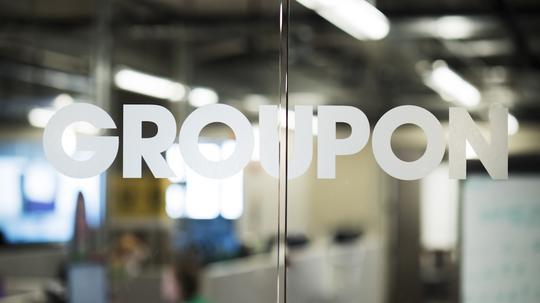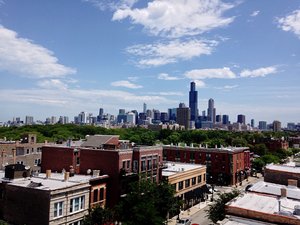
Over the last few years, Groupon has often been a punchline in tech. It's the company that turned down a $6 billion offer from Google, changed CEOs three times in three years and saw its stock price hit an all-time low in 2016. Groupon ($GRPN) has aggressively scaled back its international operations, pulling out of 7 countries--and cut more than 1,000 jobs--just last year.
One former Groupon employee described the company to me as a "decaying animal corpse."
But as Groupon prepares to announce its Q3 earnings this week, there are reasons to root for it (and reasons to maybe even believe in a modest turnaround). Even an animal corpse has an upside. Death in nature provides nutrients and life for other animals.
Groupon is on the résumé of many Chicago techies and startup folks, like Dev Bootcamp founder Dave Hoover, Kapow Founder Daniel McCormick, Simple Good Founder Priya Shah, Hologram Founder Benjamin Forgan, Remote Year Founder Greg Caplan, SportsLock Founder Todd Hayden, EventUP Founder Jayna Cooke and others.
The knock on Groupon as a Chicago tech anchor tenant is that only a handful of people actually got really, really rich. The number of employees who made over $1 million may only be in the single digits, compared to a company like Cleversafe--which sold to IBM last year for $1.3 billion, made over 80 millionaires.
While Groupon's wealth may have been concentrated, the experience it provided spread throughout Chicago. Bob Matteson, an early seller at Groupon who's now founded Chicago startup Mobile Doorman, said Groupon gave people the inspiration, and a jumping off point, to continue a career in startups.
"If (Groupon) motivates someone to get more involved in the startup space, whether that's from being an early employee at a smaller company, or being a founder yourself, I think that's an extreme positive," Matteson said. "I think Groupon definitely had that."
Here's a look at some of the other things Groupon spread around in Chicago:
Fame
Before we get to why Groupon is important today, and the life it's helped breathe into the Chicago tech community, it's necessary to look back at what it was. In 2010, Groupon was the fastest growing company ever, doing more than $500 million in revenue and reaching a $1 billion valuation in just over a year and four months. With the tech world fixated on Silicon Valley darlings, it was Chicago who was home tech's fastest rocket ship.
And the media took notice. Groupon CEO Andrew Mason graced the cover of Forbes magazine. The Wall Street Journal called the company the hottest internet start-up in the country. Groupon's 2011 IPO was the biggest public offering by a US internet company since Google. And it even got a shoutout from Oprah.
"Groupon was a flare that went up and lit up the ground and everyone looked around and went 'wow Chicago does actually have a great tech community,'" TechNexus CEO Terry Howerton said. "And certainly it helped in growing that tech community. It brought more people to town. It brought more people who weren't in the industry over to the industry."
Talent
From 2009 to 2011, Groupon was hiring massively in Chicago and around the world. The company went from 37 employees in June of 2009 to more than 9,600 in June 2011. At that time, for millennials in Chicago just out of college, Groupon offered a chance to jump head first into the Chicago tech scene.
"I do think of Groupon as one of the only primary bastions of tech hiring in Chicago (at that time)," said Matthew Gilk, who graduated from Northwestern in 2012 and worked at Groupon for 13 months. Gilk is now the CTO and co-founder of Chicago startup Meal Sharing.
"Groupon has a brand name, so people might actually move from other cities to get a job here and end up cycling out of Groupon into another startup that their friend is doing," he added. "That is really where you see the tech scene growing. You really need those brand names." Groupon was becoming a household name, and a B2C behemoth in a town that's been dominated by B2B tech.
Groupon provided a landing spot for thousands of young Chicagoans, at a time where the tech scene wasn't as robust as it is today. It got people familiar with the startup community, and helped inspire them to continue a career in tech, and in Chicago, after working there, said Brian Bar, a former Groupon salesman who recently launched his own sales startup, Victory Lap.
"Groupon gave me the confidence to tackle this challenge," he said. "I just experienced so much there."
The people there gained experience that has helped fuel the city's tech ecosystem, like making sure a website can withstand traffic following a Super Bowl commercial.
"There’s not that many people in Chicago, relative to New York or San Francisco, that have delt with making sure a highly dynamic site can stay up during a Super Bowl ad," Dave Hoover said.
"That talent has really benefited the Chicago tech scene quite a bit," he added.
Culture
Groupon was certainly not the first tech company in Chicago. But it was among the first to launch with a West Coast flavor of startup mentality. Groupon was born with a quirkiness and sense of humor that was unlike most businesses in Chicago.
"It was the kind of culture where you weren't boxed in," said Mike Cerna, an early engineer at Groupon who started with the company in the early days when it was called The Point. "It was totally not Orbitz or those corporate-y Chicago environments. The environment was inspiring."
In interviews with former employees, they describe a workplace born out of improv and irreverence, and inspired by the quirkiness of its founder Mason. For example, inside Groupon's headquarters at 600 W. Chicago, Mason built a space called Michael's Room, equipped with a bed, desk, toilet (which was filled with candy) and a stationary bike that played music like "Smooth Operator" when you rode it. Michael, as the tale goes, lived in the offices prior to Groupon's arrival, and the Groupon team let him stick around. Time Out Chicago did a delightfully weird interview with "Michael" inside his bedroom in 2011.
Mason once hired a man to stand in a tutu inside Groupon's office and scribble notes in a notebook for an entire week, never speaking a word to other employees. He was also known to rent a monkey, who would come into the office with a trainer and surprise the Groupon employees.
That humor also bled into Groupon's product and company voice. Here's the beginning of a press release Groupon wrote in 2009 after it hit its 1 millionth subscriber:
“When we started Groupon last November,” writes founder and haircut magnate Andrew Mason, “We had one goal in mind — Solar colonization. Did we find the sun was able to support human life? Yes, yes we did. But did we lose a lot of men to do it?
[Long silence. Mason stares out window at sun.]
“But to have our back-up plan [a website offering deals that encourage people to explore cool things to do in their city] connect with this many people in such a short time, it’s mind-blowing,” says Mason. “Hopefully, as we continue to expand and come up with new ways to engage our loyal fans, we’ll have many million more next year.”
Andrew Mason then disturbed witnesses by taking a hearty bite from his own hand, which he revealed to be a prop hand made of taffy and was unavailable for comment for the better part of an hour due to “hand re-patching.”
Much of Groupon's editorial and sales staff was made up of Chicago's improv and theatre community, which helped fuel the company's sense of humor. It even used humor to try and win back people who had unsubscribed from the company's emails. When someone no longer wanted to receive Groupon deals, they'd get directed to a video of Mason, acting as a Groupon employee, getting splashed in the face with coffee. The idea was to guilt trip people into remaining subscribers, and according to Cerna, it worked.
"So many people loved the video and came back and resubscribed," he said. "It proved the quirkiness worked."
Groupon also helped foster a sense of entrepreneurship within the company, Cerna said. As Groupon expanded, the company allowed teams to treat each new market like a startup. Teams got to decide when to launch, how to establish a sales pipeline, what deals to run, and how to make their offerings unique to the market, Cerna said.
"Those people got a good feel for what LA was like, or New York or Boston. And they've gone off to do startups," he said. "They have that kind of confidence in place."
The Groupon Mafia
Groupon may not have minted a network of tech-savvy millionaires, but two of Groupon's three founders, Eric Lefkofsky and Brad Keywell, have continued to invest in the Chicago tech ecosystem after Groupon's IPO. The two launched a VC firm, Lightbank, which has about $200 million under management and a portfolio that includes Hireology, Sprout Social, SpotHero, Reverb and other local startups. The two have also had their hand in launching Drivin, a startup that's helping used car dealerships source cars and sell smarter using data science.
Lefkofsky and Keywell have also recently launched new ventures of their own. Uptake, Keywell's baby, has raised $45 million and reached a $1 billion valuation in under two years. Lefkofsky's project Tempus is working to fight cancer by analyzing a patient’s genetic code to help doctors make personalized, data-driven treatment decisions.
The success of Groupon has certainly aided the growth of Lefkofsky and Keywell's latest ambitions.
Signs of a turnaround
The downfall of Groupon has been well documented. The company grew too fast, scaled too quickly and in some ways has failed to maintain its quirky, fun personality. It booted Andrew and went corporate. But as earnings are set to come out Wednesday, Groupon's stock price is up over 45% in the last 12 months. The company has pivoted from daily deals to become an ecommerce destination for discounts on goods, travel and other experiences. Groupon's app sees 30 million monthly unique visitors, making its the 22nd most popular app in the US, ahead of Walmart, eBay and Yahoo Mail.
Last quarter Groupon beat earnings and revenue estimates, with revenues of $756 million. And with analysts predicting another positive quarter for Groupon, maybe there's life left in Chicago's animal corpse.
Image via Groupon








